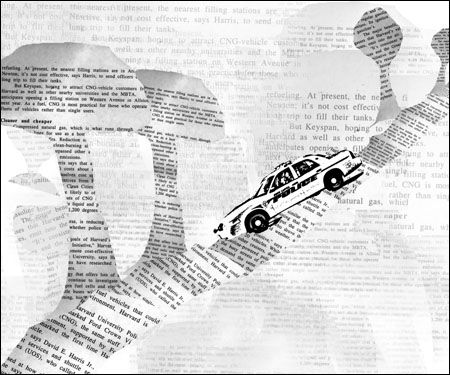HUPD takes a natural test-drive:
Natural compressed gas assessed in police cruiser and shuttle van experiments

When it comes to testing alternative fuel vehicles that could reduce the University’s impact on the environment, Harvard is cooking with gas.
For three weeks in January, the Harvard University Police Department (HUPD) test-drove an unmarked Ford Crown Victoria that ran on compressed natural gas (CNG), the same stuff that boils water and heats homes. The experiment, supported by Ford and natural gas provider Keyspan, marked the first time Harvard had tested an alternative fuel vehicle.
But it won’t be the last, says David E. Harris Jr., general manager of fleet management services and shuttle services for University Operations Services (UOS), who called the test-drive a qualified success.
“We were very surprised at how similar the vehicle was to a normal gasoline vehicle,” he says, noting that the frigid weather served up plenty of opportunities to put the car’s functionality to the test. The dozen HUPD officers who drove the vehicle commented that it started well, even in the cold weather, and had plenty of pickup.
“The response was very positive,” says HUPD Sgt. Dan Brown, fleet manager for HUPD’s 20 vehicles. While the car, which is the same model as HUPD’s other cruisers, doesn’t have as much horsepower as the gasoline-powered police cars, Brown noted that the fleet’s use on the busy streets of Cambridge, Boston, and Watertown doesn’t demand the same power that highway use would.
Brown and Harris reported that Ford and Keyspan are working at eliminating two more serious concerns: the weight of the three tanks in the trunk of the vehicle, and the inconvenience of refueling. At present, the nearest filling stations are in Arlington or Newton; it’s not cost effective, says Harris, to send officers on such a long trip to fill their tanks.
But Keyspan, hoping to attract CNG-vehicle customers from Harvard as well as other nearby universities and the MBTA, anticipates opening a filling station on Western Avenue in Allston by next year. As a fuel, CNG is most practical for those who operate fleets of vehicles rather than single users.
Cleaner and cheaper
Compressed natural gas, which is what runs through residential gas lines for use as a home-heating and cooking fuel, offers significant benefits. Reduction of emissions is chief among them; natural gas is a clean-burning alternative fuel and natural gas vehicles (NGVs) have surpassed other alternative fuel competitors in reducing certain types of emissions.
It’s cheaper, too. Harris says that at current prices, the domestically produced CNG costs about one-third less than gasoline. And while the vehicles themselves cost up to $5,000 more than traditional fuel vehicles, incentives from Ford and Keyspan as well as the Department of Energy’s Clean Cities Initiative, to which Harris is Harvard’s representative, are likely to offset that cost.
Harris and other proponents of CNG also laud its safety. Unlike regular gasoline, which is liquid and pools if it spills, CNG vaporizes. Its ignition point of 1,200 degrees is about twice as high as gasoline’s.
The major benefit, of course, is reducing the greenhouse gasses that Harvard’s vehicles, whether police cruisers or shuttle buses, emit into the air.
“It’s consistent with the goals of Harvard’s Transportation Services and the Green Campus Initiative,” Harvard’s University-wide initiative that works to promote cost-effective conservation of the Earth’s resources around the University, says Harris. Green Campus Initiative summer interns have researched alternative fuel vehicles for the past two summers.
CNG is a proven technology that offers lots of advantages, but Harris says the University will continue to investigate other alternative fuels such as hydrogen fuel cells and electric. This spring, some of Harvard’s shuttle buses will run on biodiesel, made of soybean oil. Also clean burning, biodiesel has the advantage over CNG in that it can be pumped directly into traditional diesel vehicles, reducing the cost of entry.
And in February, passengers who use the University’s shuttle service might catch a ride to the future: Harris reports that Ford just delivered a fully accessible CNG shuttle van for Harvard to try out for a month.
Test-drives like these are helping Harvard become a leader in alternative fuel vehicles.
“The alternative fuel vehicle program has the support of the University from the top down,” says Harris. “That’s made it easy to go out and research these types of alternative fuels.”




